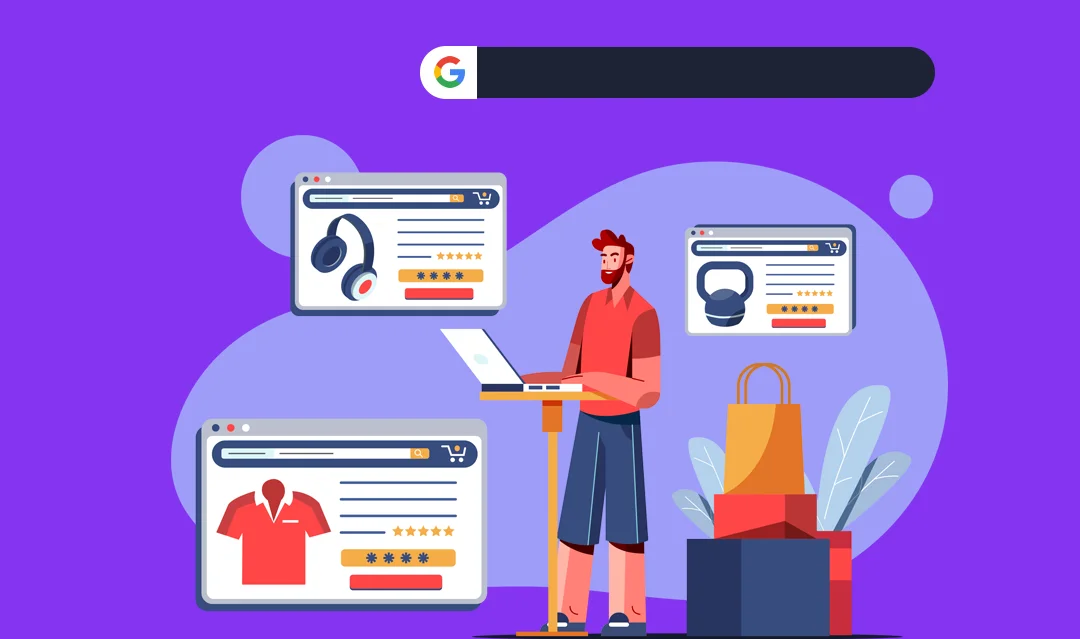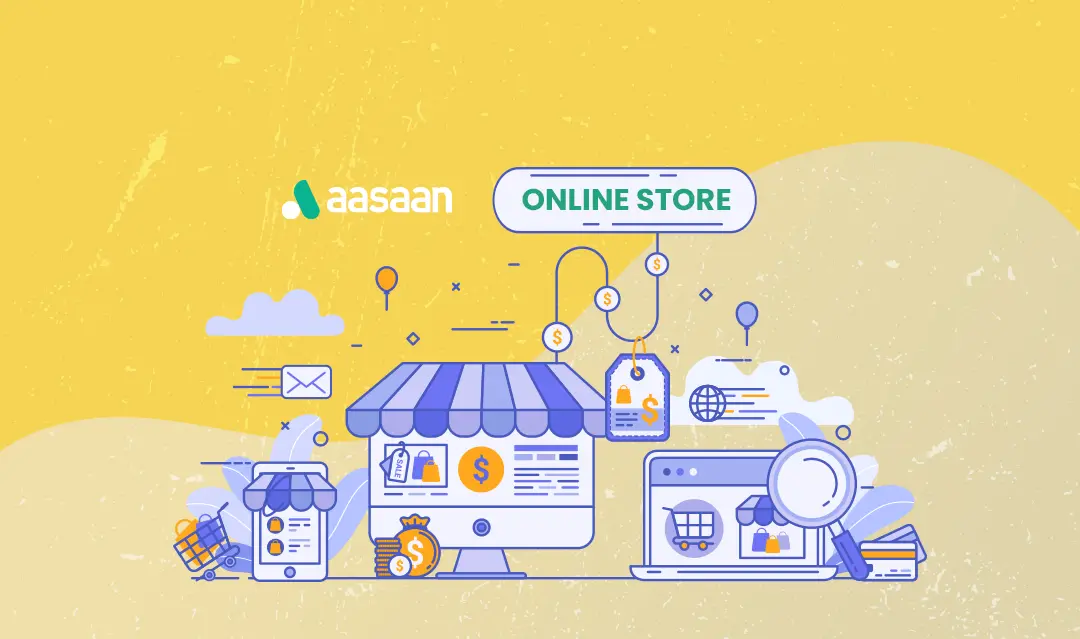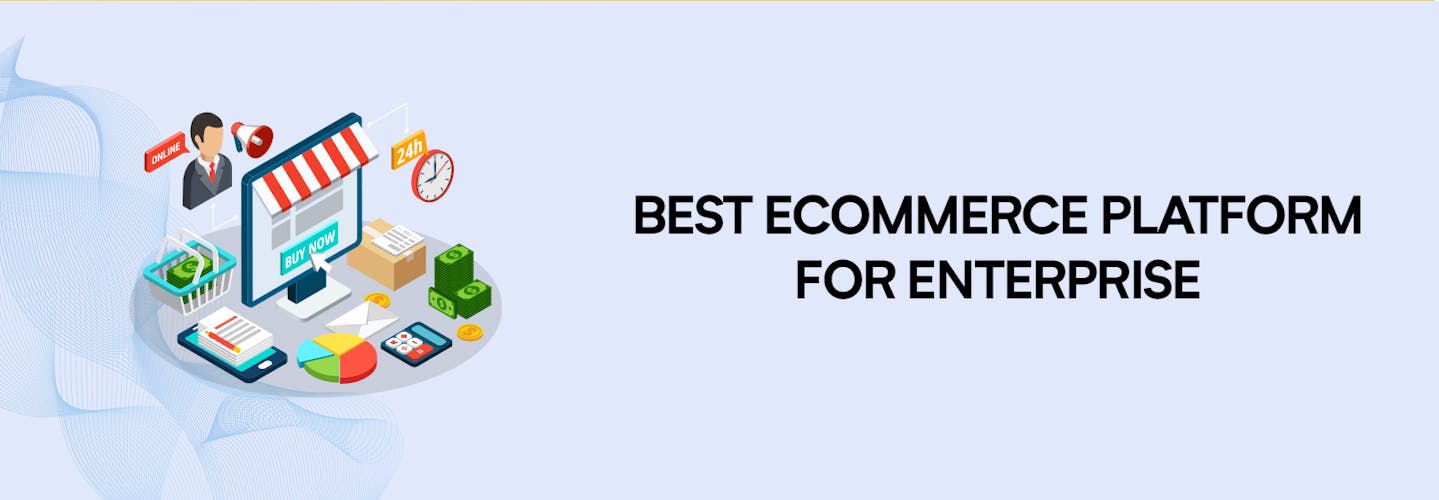
10 Best Enterprise Ecommerce Platforms (Boost Your Sales Now)
In today’s fast-paced business world, eCommerce platforms have become an essential part of any enterprise looking to succeed.
With the advent of technology, businesses can now reach a wider audience and conduct transactions online conveniently.
However, with the market saturated with many types of eCommerce platforms, choosing the right one can be a daunting task.
One such platform is Enterprise eCommerce Platforms which are designed to cater to large businesses with complex needs and high volumes of transactions.
In this article, we will explore what Enterprise eCommerce software are, their importance in modern business. Let’s get started!
What Is An Enterprise Ecommerce solution?

Enterprise eCommerce Platforms refers to a software solution that caters to large businesses by offering features that cater to their complex needs.
They provide advanced functionalities such as high availability, scalability, security, customization options, and integration with other systems within an organization.
Enterprise solutions typically offer more comprehensive solutions than regular ecommerce platforms by providing advanced order management systems (OMS), product information management (PIM), customer relationship management (CRM) systems among other functionalities.
This means that enterprise ecommerce platforms are designed for high transactional volumes across various sales channels including online stores, marketplaces and social media sites.
Why Are Enterprise Ecommerce Platforms Important?
Enterprise Ecommerce system offer essential benefits that empower modern businesses to stay competitive and sustain growth. Some key factors include:
- Scalability: These platforms are designed to handle a large volume of transactions and customer data, making them ideal for large businesses that need to scale up quickly.
- Integration Capabilities: Enterprise-level ecommerce platforms often come with built-in integrations for CRM, ERP, and other business systems, allowing for seamless data flow and improved operational efficiency.
- Customization: These platforms typically offer a high degree of customization, allowing businesses to tailor the platform to their specific needs and branding.
- Advanced Features: Enterprise eCommerce softwares often come with advanced features like AI-powered recommendations, advanced search capabilities, and sophisticated analytics tools, which can help businesses improve their customer experience and make data-driven decisions.
- Security: These platforms are designed with robust security measures to protect sensitive customer data and transactions, which is crucial for maintaining customer trust and complying with data protection regulations.
- Global Expansion: Enterprise eCommerce platforms often support multiple languages and currencies, making it easier for businesses to expand internationally.
- Customer Support: These platforms usually come with dedicated customer support, which can be invaluable for resolving issues quickly and minimizing downtime.
- Improved Customer Experience: With features like personalized shopping experiences, easy checkout processes, and customer loyalty programs, enterprise eCommerce platforms can help businesses improve their customer experience and boost customer retention.
- Efficient Inventory Management: These platforms often include inventory management features that can help businesses track stock levels, manage suppliers, and prevent stockouts or overstocking.
- Marketing Tools: Many enterprise eCommerce platforms come with built-in marketing tools for SEO, email marketing, social media marketing, and more, helping businesses reach their target audience more effectively.
High-level Overview of Enterprise eCommerce Platforms
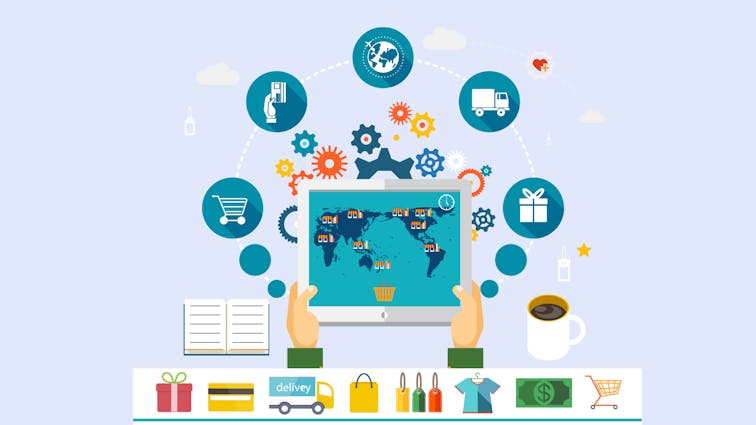
Enterprise eCommerce systems are software solutions designed to help businesses manage their online retail operations.
These platforms provide a range of features and functionalities, including product catalogs, shopping carts, payment processing systems, and customer management tools.
They are typically used by large organizations that require advanced capabilities for managing their online sales channels.
Key Features and Functionalities
Enterprise eCommerce platforms come equipped with a range of features and functionalities that make them ideal for large businesses. Some of the most important features include:
- Product Catalog Management: the ability to create, manage, and publish product catalogs with rich content such as images, videos or 360-degree views.
- Advanced Search Engine Optimization (SEO): customizable urls, meta tags and descriptions to improve search engine rankings.
- Payment Processing: integration with multiple payment gateways for secure transactions.
- Sales Analysis: advanced reporting analytics to monitor sales data in real-time across different devices from any location.
- Multichannel Selling: ability to sell on multiple marketplaces including amazon, ebay or facebook marketplace allowing greater reach for products.
These are just a few examples of the powerful features available in enterprise eCommerce platforms.
Now that you understand the importance & Overview of large scale Enterprise ecommerce platforms for modern businesses, let’s take a look at the top 10 options you should consider for 2025:
Types of Enterprise Ecommerce Solutions
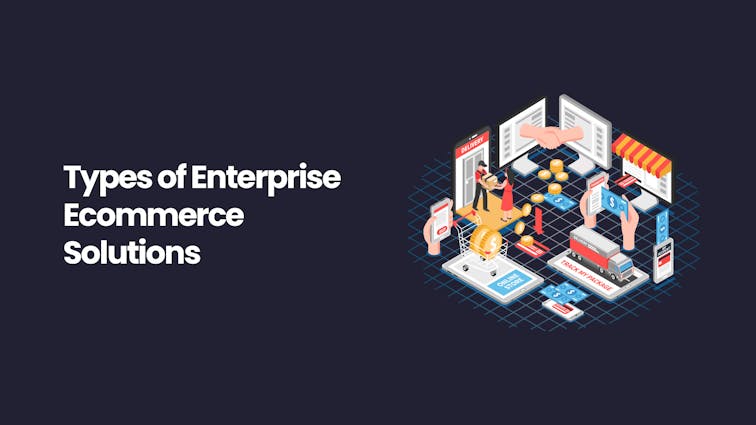
Enterprise eCommerce solutions are platforms designed to support the complex needs of large-scale businesses that operate online.
These solutions provide a wide range of features and functionalities to manage various aspects of an eCommerce business, such as product management, customer service, sales, marketing, analytics, and more.
Here are some common types of enterprise eCommerce solutions:
1. On-Premise eCommerce Solutions
These solutions are installed and run on the company’s own servers. They offer a high level of customization and control but require significant investment in hardware, software, and IT support.
Examples:
- Magento Enterprise Edition
- SAP Hybris
- IBM WebSphere
2. Cloud-Based eCommerce Solutions
Cloud-based solutions are hosted on a third-party provider’s servers, offering scalability and flexibility. They are generally easier to set up and maintain but may offer less customization.
Examples:
- Shopify Plus
- BigCommerce Enterprise
- Salesforce Commerce Cloud
3. Open Source eCommerce Solutions
Open source solutions provide the source code, allowing businesses to modify and customize the platform according to their needs. They often require technical expertise but offer a high level of control.
Examples:
- WooCommerce
- PrestaShop
- OpenCart
4. SaaS (Software as a Service) eCommerce Solutions
SaaS solutions are subscription-based and hosted on the provider’s servers. They offer ease of use, regular updates, and support but may have limitations in customization.
Examples:
- Adobe Commerce Cloud
- Kibo Commerce
- Oracle Commerce Cloud
5. Headless eCommerce Solutions
Headless solutions separate the front-end (customer-facing) and back-end (administrative) aspects of the platform, allowing for more flexibility in design and integration with other systems.
Examples:
- Elastic Path
- commercetools
- Moltin
- Aasaan
6. B2B (Business to Business) eCommerce Solutions
These solutions are specifically designed to cater to the needs of businesses selling to other businesses. They include features like bulk ordering, customized pricing, and integration with ERP systems.
Examples:
- InsiteCommerce
- OroCommerce
- NetSuite SuiteCommerce
7. Omnichannel eCommerce Solutions
Omnichannel solutions provide a seamless shopping experience across various channels, such as online, mobile, in-store, and social media.
Examples:
- SAP C/4HANA
- Microsoft Dynamics 365 Commerce
- Episerver Commerce
How to choose the right enterprise ecommerce platform
Choosing the right enterprise eCommerce platform is a critical decision that can significantly impact the success of your online business.
The platform must align with your business goals, budget, technical capabilities, and future growth plans.
Here’s a step-by-step guide to help you choose the right enterprise eCommerce platform:
1. Identify Your Business Needs and Goals
- Size and Scale: Consider the size of your business and the expected growth in the coming years.
- Target Market: Identify your target audience and their preferences.
- Product Complexity: Consider the types of products you sell and any specific requirements they may have.
2. Evaluate the Features and Functionalities
- Product Management: Look for robust product management tools.
- Customer Experience: Consider features that enhance the user experience, such as personalization and search functionality.
- Integration Capabilities: Check for integrations with existing systems like ERP, CRM, etc.
- Mobile Responsiveness: Ensure the platform offers a seamless mobile shopping experience.
3. Consider the Technical Aspects
- Customization: Assess the level of customization the platform allows.
- Scalability: Ensure the platform can handle increased traffic and sales as your business grows.
- Security: Look for robust security features to protect customer data.
- SEO Friendliness: Check if the platform is optimized for search engines.
4. Assess the Costs
- Initial Costs: Consider the upfront costs of purchasing or subscribing to the platform.
- Ongoing Costs: Evaluate the ongoing costs for maintenance, updates, and support.
- Total Cost of Ownership (TCO): Calculate the TCO to ensure it aligns with your budget.
5. Check for Support and Training
- Customer Support: Look for platforms that offer reliable customer support.
- Training and Documentation: Check if the provider offers training and comprehensive documentation to help your team.
6. Review Customer Testimonials and Case Studies
- Customer Feedback: Read reviews and testimonials from other businesses that have used the platform.
- Case Studies: Look for case studies that demonstrate how the platform has been successfully implemented in similar businesses.
7. Request a Demo or Trial
- Demo: Request a live demo to see the platform in action.
- Trial: If possible, opt for a free trial to test the platform with your products and processes.
8. Consider Compliance and Regulations
- Legal Compliance: Ensure the platform complies with legal regulations in your region.
- Industry Standards: Check if the platform meets industry standards and certifications.
9. Evaluate Future Growth and Innovation
- Future Upgrades: Look for a platform that regularly updates and innovates.
- Alignment with Future Goals: Ensure the platform aligns with your long-term business goals and growth plans.
10 Best Enterprise eCommerce Platforms in 2025
1. Aasaan:
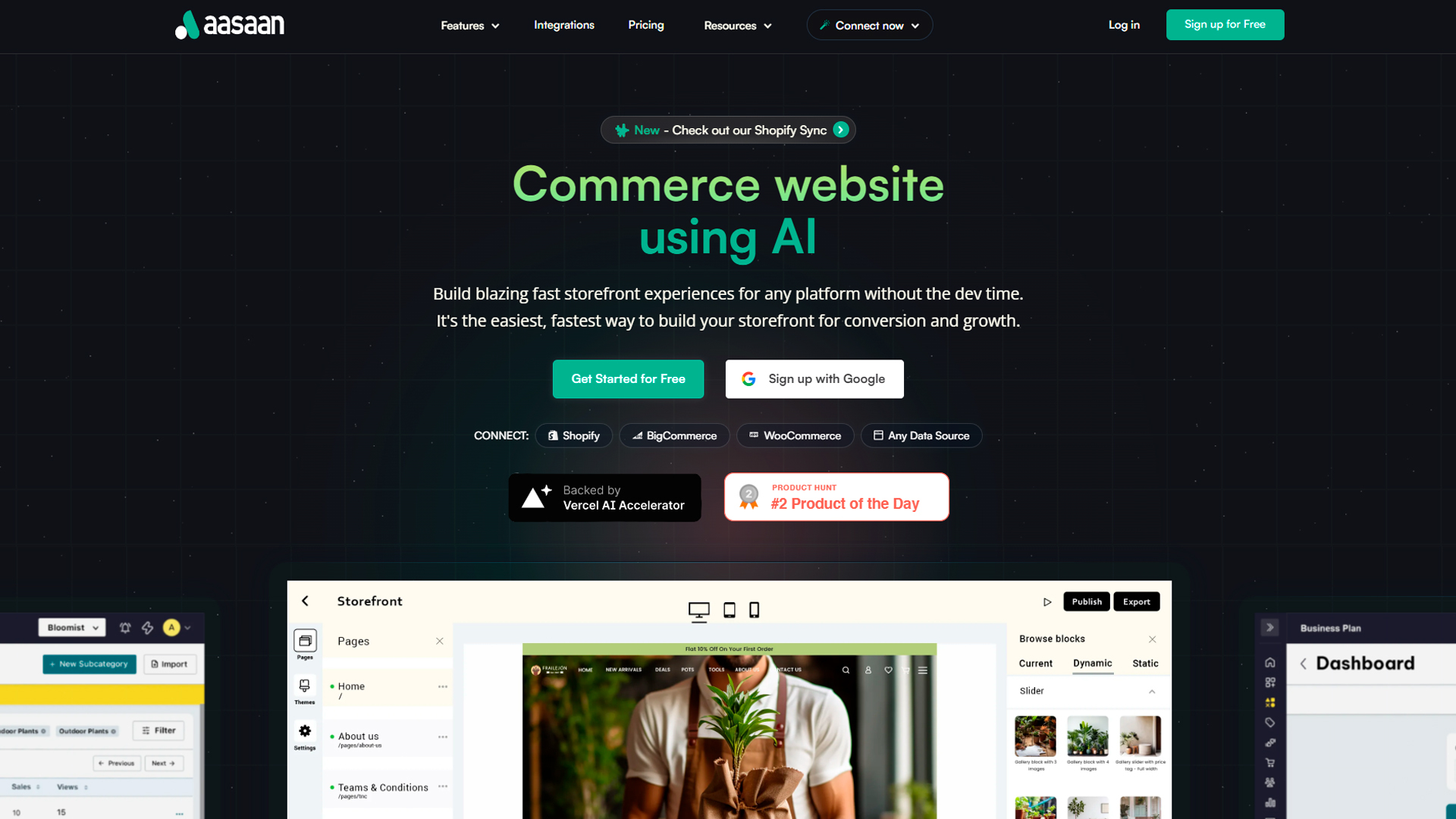
Aasaan is a user-friendly eCommerce platform aimed at providing seamless online selling experiences for businesses of all sizes.
With its simplistic interface, low-cost feature sets, and easy-to-use tools, Aasaan ensures that even those with limited technical skills can effectively manage their online store.
Pros:
- Simple and easy-to-use interface
- Affordable pricing plans suitable for businesses of all sizes
- Allows quick set up and minimal management requirements
- Mobile responsive themes and storefront design
- Strong customer support and reliability
Cons:
- The free plan includes Aasaan branding.
- Limited advanced features for highly customized websites.
2. Shopify Plus:
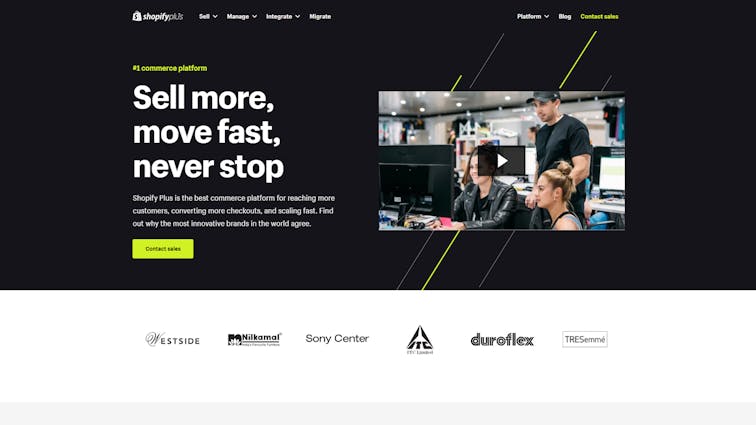
Shopify Plus is a fully-hosted, cloud-based platform built for high-growth businesses aiming to provide a seamless shopping experience.
With its intuitive interface, extensive apps ecosystem, and scalability, Shopify Plus is an excellent choice for enterprises seeking an easy-to-use solution.
Pros:
- User-friendly and intuitive interface
- Host of available apps and integrations
- Great for global expansion with support for multiple languages and currencies
Cons:
- Customization can be somewhat limited compared to open-source platforms
- Transaction fees apply unless using Shopify Payments
- Some features may require third-party apps, which can add up in cost.
- No access to code
3. BigCommerce Enterprise:
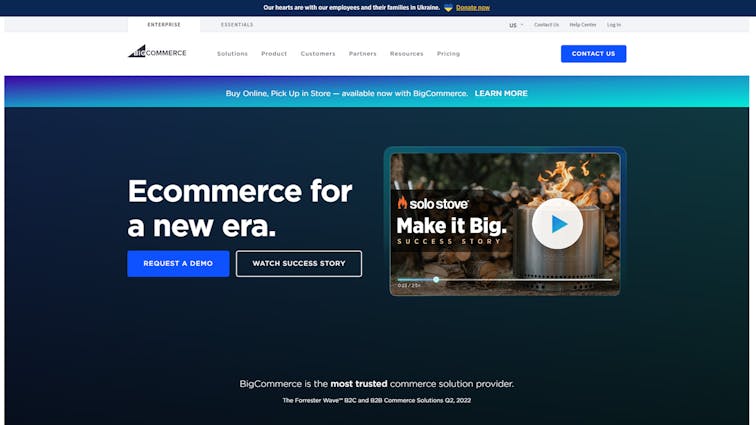
BigCommerce Enterprise is a SaaS eCommerce platform that offers comprehensive features and enormous flexibility for businesses.
With its emphasis on scalability and security , BigCommerce provides an ideal solution for fast-growing companies looking to expand globally.
Pros:
- Highly customizable and flexible
- Strong built-in features and integrations
- Multi-store functionality for international and localized sites
- Ongoing updates and enterprise-grade security
Cons:
- High volume traffic can cause latency
- API call limitations
- Add-ons can become expensive
4. SAP Commerce Cloud:
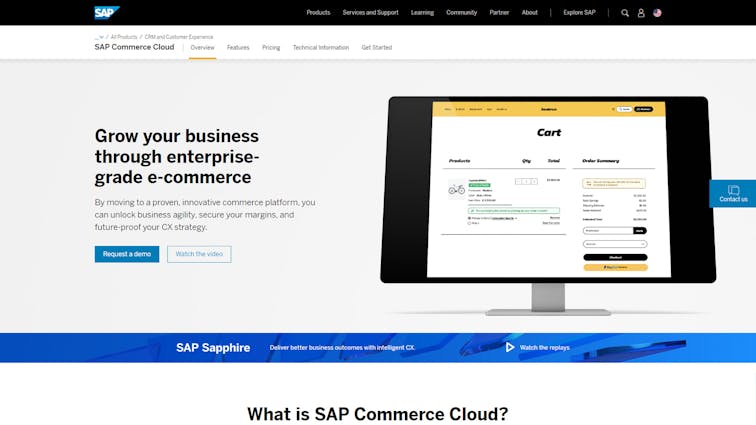
SAP Commerce Cloud is a powerful eCommerce platform with omni-channel capabilities, designed for businesses operating on a large scale.
Its broad range of features and seamless integration with other SAP software make it a robust and comprehensive solution for enterprise needs.
Pros:
- Seamless integration with other SAP products and software
- Wide range of features and functionalities for large-scale operations
- Sophisticated personalization and marketing tools
- Great scalability and flexibility
Cons:
- Steeper learning curve for users
- Higher costs compared to some competitors
- Implementation can be time-consuming and complex.
5. Salesforce Commerce Cloud:
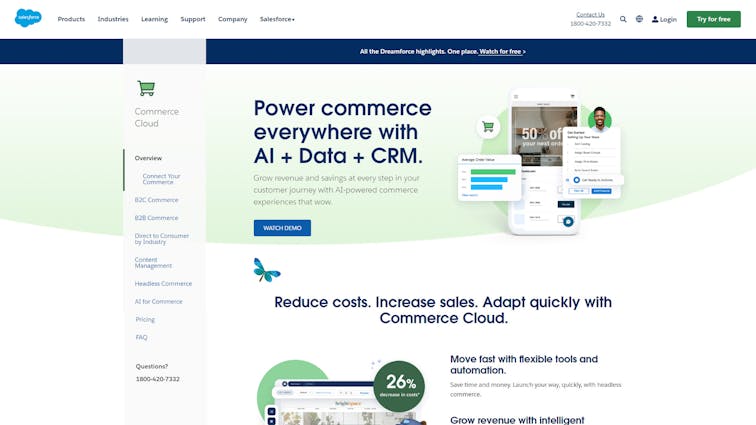
Salesforce Commerce Cloud, formerly known as Demandware, is an adaptable, cloud-based platform designed to power large and rapidly growing retail businesses.
With a solid suite of features and seamless integration with other Salesforce products, this platform provides a comprehensive solution for retailers.
Pros:
- Built-in AI-powered personalization and customer insights
- Integration with other Salesforce products for an all-in-one solution
- Continuous updates and enhancements
- Offers multi-site and multi-language support
Cons:
- Higher costs and revenue-based licensing model
- Requires skilled development team for customization
- Limited third-party app ecosystem compared to some competitors.
6. Adobe Commerce (previously known as Magento Commerce Cloud):
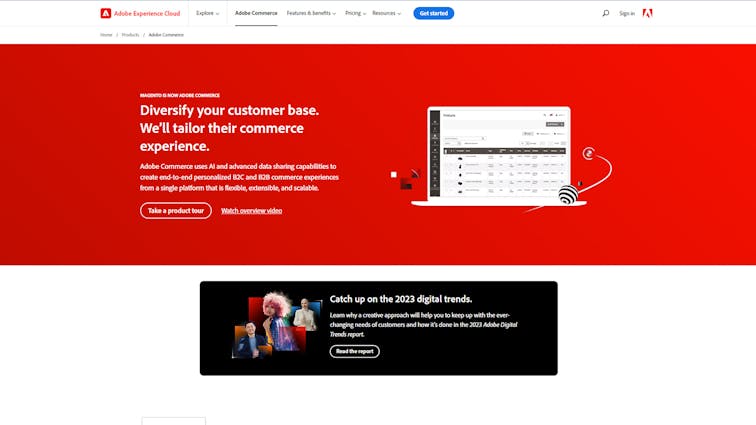
Adobe Commerce is a powerful cloud-based eCommerce platform that combines thebest of Magento Commerce with Adobe’s suite of tools, offering a comprehensive solution for large enterprises.
With its rich set of features and flexible customizations, Adobe Commerce provides an optimal platform for transforming customer experiences.
Pros:
- Seamless integration with Adobe Experience Cloud and other Adobe products
- High level of flexibility and customizability
- Robust set of features for a tailored shopping experience
- Scalability to accommodate growing businesses
Cons:
- Higher costs associated with development and maintenance
- Requires skilled development team for customizations
- Can be resource-intensive, potentially affecting site performance
7. WooCommerce Enterprise:
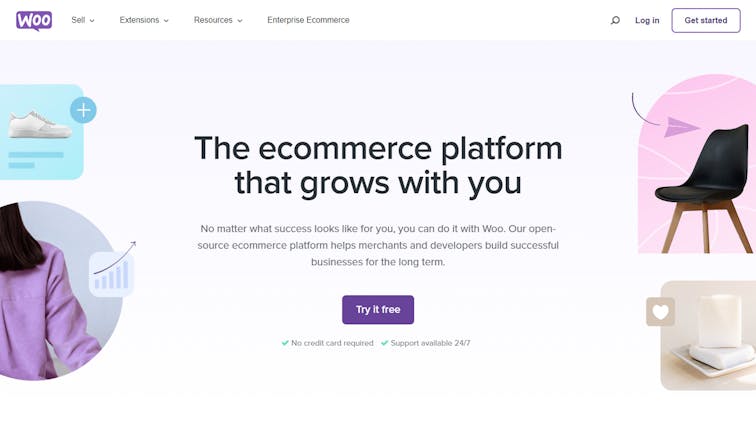
WooCommerce Enterprise is a powerful , open-source eCommerce platform built for versatile and ambitious stores.
As a fully-customizable extension for WordPress, it is a popular choice among enterprises that demand a significant level of control and personalization for their online presence.
Pros:
- Access to the extensive community of WordPress plugins and themes
- Highly customizable and seamlessly integrates with WordPress
- Familiar interface for users experienced with WordPress
- Large user community and developer support
Cons:
- Requires skilled developers for customization and maintenance
- Can be resource-intensive, affecting site performance
- Hosting and security must be managed separately
- Limited built-in functionality compared to other platforms
8. Oracle CX Commerce:
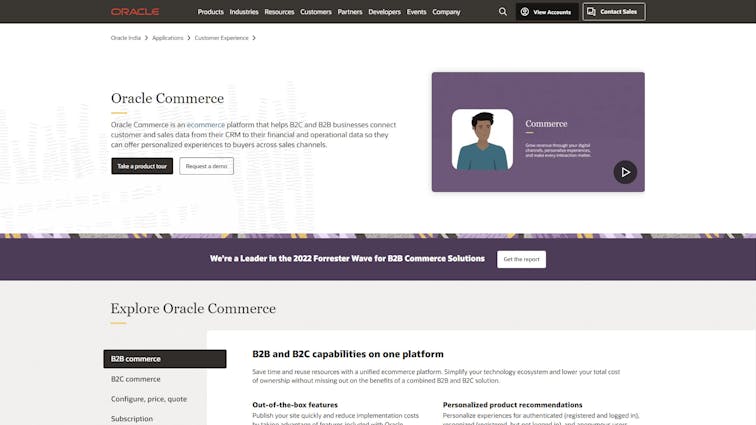
Oracle CX Commerce, formerly known as ATG Commerce, is a comprehensive eCommerce solution designed for large-scale enterprises.
With robust features, personalization capabilities, and seamless integration with other Oracle applications, Oracle CX Commerce offers a global platform for businesses.
Pros:
- Flexible and highly customizable
- Advanced personalization and marketing capabilities
- Seamless integration with other Oracle products
- Strong support for global and multi-site operations
Cons:
- Steeper learning curve and complexity
- Can be more expensive than some competitors
- Requires skilled development for customization and ongoing maintenance
9. PrestaShop Enterprise:
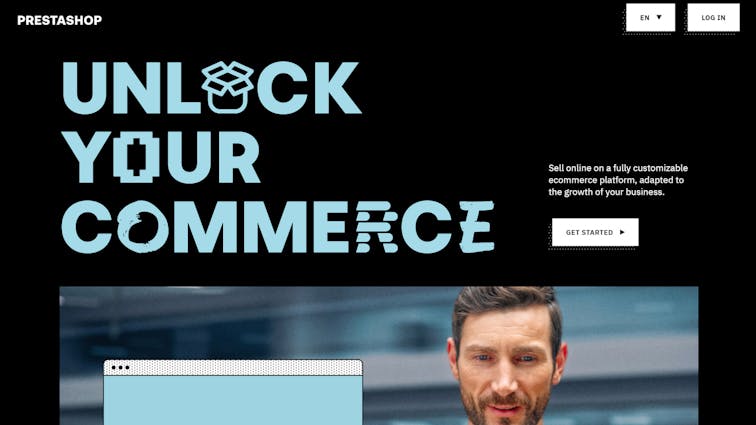
PrestaShop Enterprise is an open-source eCommerce platform popular among enterprises looking for greater control and customization capabilities.
With its huge range of features, PrestaShop provides an extensive, feature-packed platform for ambitious businesses.
Pros:
- Open-source platform allows for high level of customization
- Large marketplace for add-ons and themes
- Active community and developer support
- Multi-language and multi-currency support
Cons:
- Requires skilled developers for customization and ongoing maintenance
- Can be resource-intensive, potentially impacting site performance
- Hosting and security must be managed separately
- Higher cost associated with extensive customization options
10. Volusion Enterprise:
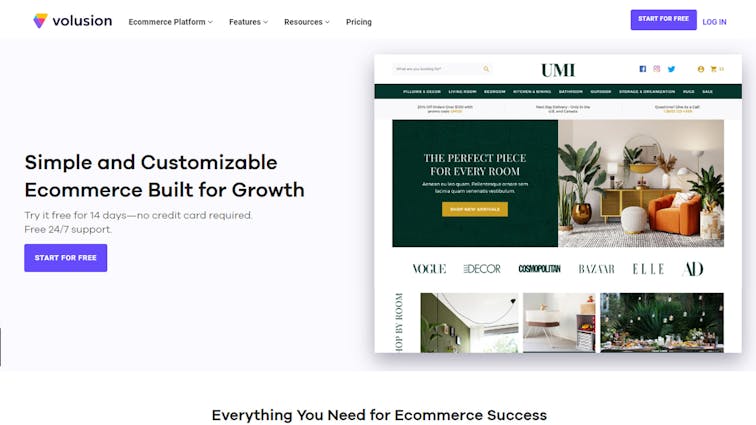
Volusion Enterprise is a cloud-based eCommerce platform designed specifically for businesses seeking a customizable and scalable solution.
Developed to cater to the needs of enterprises, Volusion offers a feature-rich platform aimed at driving success in eCommerce operations.
Pros:
- Fully-hosted solution with uptime guarantee
- A wide variety of built-in features and integrations
- No transaction fees
- Drag-and-drop website builder for easy customization
Cons:
- Limited third-party app integrations when compared to some competitors
- Lack of built-in multi-language support
- Requires skillful development team for advanced customizations
- New features need constant investments
Conclusion:
Choosing the right enterprise ecommerce software is a crucial decision that can significantly impact your business’s success.
Each platform has its strengths and weaknesses, and the best choice depends on your specific needs, resources, and goals.
Whether you prioritize scalability, customization, security, or integration capabilities, there’s a platform out there that’s perfect for your business.
Remember, the best platform for you is one that fits your business like a glove, supporting your growth and helping you deliver an exceptional customer experience.
Frequently Asked Questions
1: What factors should I consider when choosing an enterprise eCommerce platform?
Key factors to consider include scalability, security, customizability, and integration capabilities. It’s also important to consider the platform’s cost, customer support, and community of users.
2: What are some of the best enterprise eCommerce platforms in 2023?
Some of the best platforms include Aasaan, Shopify Plus, Magento Commerce, BigCommerce Enterprise, Salesforce Commerce Cloud, and SAP Commerce Cloud, among others.
3: Do I need technical skills to use an enterprise eCommerce platform?
While some platforms are more user-friendly than others, most enterprise eCommerce platforms require some level of technical expertise to fully leverage their features and capabilities.
4: Can I switch eCommerce platforms if I’m not satisfied with my current one?
Yes, it’s possible to migrate from one eCommerce platform to another. However, this can be a complex process that requires careful planning to avoid data loss or downtime.



